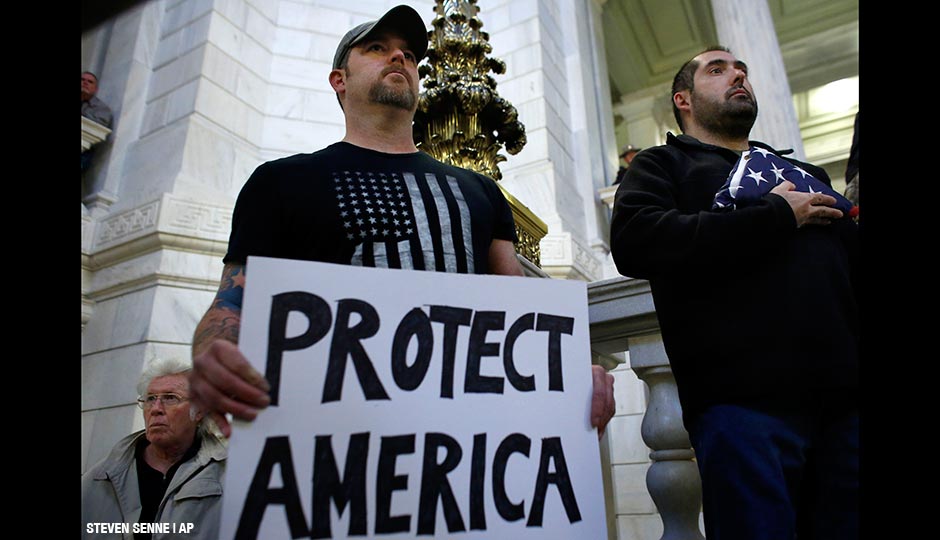What Lots of Americans Don’t Get About Islam

Veterans during a rally Thursday, Nov. 19, 2015, at the Statehouse, in Providence, R.I., held to demonstrate against allowing Syrian refugees to enter Rhode Island following the terror attacks in Paris.
I am a Christian. So is Pope Francis. So was the Rev. Fred Phelps.
I don’t think anyone reading this would confuse any one of the three of us for the other.
Yet too many of us here in America do exactly that when it comes to dealing with Islam and Muslims, and in our current paranoid state in the wake of the ISIS attacks on Paris, our inability or refusal to recognize diversity within Islam may mean that we will fail in meeting a humanitarian imperative.
We see this already in the reaction of about half the nation’s governors to an Obama Administration call for America to take in 10,000 refugees fleeing the Syrian civil war. Thankfully, our own Tom Wolf is not one of those governors: He understands that, even with stringent vetting procedures in place, it will be impossible to reduce the risk that someone undesirable just might slip in to zero, which is what the paranoid demand.
They also demand that Muslims either condemn ISIS or join in the fight against it.
Guess they’re not paying attention here either, for both have taken place and are ongoing.
There’s a lot of ferment going on within the Islamic world as sects battle for supremacy amid calls for an Islamic Enlightenment. Many Islamic scholars and other Muslims lay blame for ISIS at the feet of the rulers of Saudi Arabia, who adhere to a Puritanical version of Islam called Salafism by its adherents and Wahhabism by its critics. Some of the practices advocated by Wahhabi religious leaders bring to mind the severe strictures the 17th-century Christians we call Puritans also advocated, and for similar reasons.
Free-thinking Muslims have also staked a claim on the future of the religion. Perhaps the best known of these is Canadian commentator Irshad Manji, whose cry of conscience The Trouble With Islam Today has won her both fans and foes among her fellow Muslims. She too lays claim to a legitimate history of tolerance and intellectual inquiry among Muslims that can be traced to the early years of the Arab caliphate, when the Fertile Crescent was one of the most tolerant places in the world before the Crusaders laid waste to it.
These sorts of arguments bear strong resemblance to arguments that riled Christianity centuries ago and continue to reverberate through the Christian world today. Those arguments gave us the Protestant branch of the faith and even spawned more radical offshoots like the Quakers and Unitarians, whose connection to mainstream Christianity has largely been severed. Similar movements exist in Islam; who among us knows about the Ahmadiyya? (This branch has a mobile bookstore that often sets up shop at Broad Street and Cecil B. Moore Avenue, at the gateway to both the heart of North Philadelphia and the Temple University campus.)
What, then, is Islam? It’s a religion that is as diverse, complex and contradictory as Christianity, with debates raging that would put those among practitioners of Judaism to shame. Of those three great monotheistic religions of the Levant, it’s also the youngest, so it should surprise no one that it’s experiencing growing pains. Yet to hear the fears of the paranoid, it’s a single monolith bent on wiping out its rivals.
That may be true for some sects, and we are wise to keep an eye on them. But most Muslims, like most Christians and Jews, simply wish to live their lives in peace. We should not turn away those who come here seeking to do so, especially when so many of their co-religionists have already found that peaceful life here in America and have assimilated into American society.
Follow @MarketStEl on Twitter.


